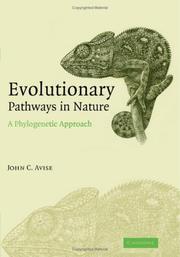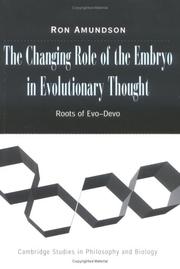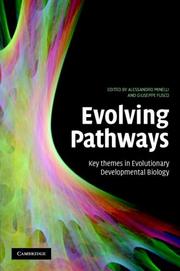| Listing 1 - 8 of 8 |
Sort by
|
Book
ISBN: 2759231704 9782759231713 2759231712 9782759231706 Year: 2020 Publisher: Versailles Cedex
Abstract | Keywords | Export | Availability | Bookmark
 Loading...
Loading...Choose an application
- Reference Manager
- EndNote
- RefWorks (Direct export to RefWorks)
This book, authored by Pierre-Henry Gouyon, delves into the complexities of evolutionary biology and its implications on the perception of natural harmony. It explores the theories of genetics and evolutionary conflicts, drawing on historical contexts such as Linnaean and Darwinian views. The book also examines the application of evolutionary theory across various biological domains, emphasizing the importance of genetic polymorphism and biodiversity. Targeting an audience interested in scientific and sociological questions, it offers insights into the role of evolutionary biology in understanding ecological dynamics and resource management. The text is a product of a conference facilitated by the INRAE, aiming to provide critical reflections on scientific research and its societal impacts.
Book
ISBN: 0199390479 0199390460 9780199390465 9780199390472 9780199390458 0199390452 Year: 2016 Publisher: New York, NY
Abstract | Keywords | Export | Availability | Bookmark
 Loading...
Loading...Choose an application
- Reference Manager
- EndNote
- RefWorks (Direct export to RefWorks)
In this fascinating read, Kauffman concludes that the development of life on earth is not entirely predictable, because no theory could ever fully account for the limitless variations of evolution. Sure to cause a stir, this book will be discussed for years to come and may even set the tone for the next "great thinker.".

ISBN: 0521857538 0521674174 9780521857536 9780521674171 9780511606939 0511219318 9780511219313 9780511221286 0511221282 0511219997 9780511219993 0511220510 9780511220517 0511606931 128048022X 9781280480225 1107166748 9786610480227 0511324251 Year: 2006 Publisher: Cambridge : Cambridge University Press,
Abstract | Keywords | Export | Availability | Bookmark
 Loading...
Loading...Choose an application
- Reference Manager
- EndNote
- RefWorks (Direct export to RefWorks)
Reconstructing phylogenetic trees from DNA sequences has become a popular exercise in many branches of biology, and here the well-known geneticist John Avise explains why. Molecular phylogenies provide a genealogical backdrop for interpreting the evolutionary histories of many other types of biological traits (anatomical, behavioral, ecological, physiological, biochemical and even geographical). Guiding readers on a natural history tour along dozens of evolutionary pathways, the author describes how creatures ranging from microbes to elephants came to possess their current phenotypes. Essential reading for college students, professional biologists and anyone interested in natural history and biodiversity, this book is packed with fascinating examples of evolutionary puzzles from across the animal kingdom; how the toucan got its enormous bill, how reptiles grow back lost limbs and why Arctic fish don't freeze.
Evolution (Biology). --- Phylogeny. --- molecular phylogeny --- evolutionary ecology --- evo-devo (evolutionary developmental biology) --- Evolution (Biology) --- Animal evolution --- Animals --- Biological evolution --- Darwinism --- Evolutionary biology --- Evolutionary science --- Origin of species --- Biology --- Evolution --- Biological fitness --- Homoplasy --- Natural selection --- Phylogeny --- Animal phylogeny --- Phylogenetics --- Phylogeny (Zoology)

ISBN: 0521806992 9780521806992 9781139164856 9780521703970 0511113269 9780511113260 1139164856 9780511198236 051119823X 1107131391 9781107131392 1280415169 9781280415166 9786610415168 6610415161 0511181485 9780511181481 0511112750 9780511112751 0521703972 051130885X Year: 2005 Publisher: Cambridge ; New York : Cambridge University Press,
Abstract | Keywords | Export | Availability | Bookmark
 Loading...
Loading...Choose an application
- Reference Manager
- EndNote
- RefWorks (Direct export to RefWorks)
In this book Ron Amundson examines two hundred years of scientific views on the evolution-development relationship from the perspective of evolutionary developmental biology (evo-devo). This perspective challenges several popular views about the history of evolutionary thought by claiming that many earlier authors had made history come out right for the Evolutionary Synthesis. The book starts with a revised history of nineteenth-century evolutionary thought. It then investigates how development became irrelevant with the Evolutionary Synthesis. It concludes with an examination of the contrasts that persist between mainstream evolutionary theory and evo-devo. This book will appeal to students and professionals in the philosophy and history of science, and biology.
Developmental biology --- Embryology --- Evolution (Biology) --- evolutietheorie (darwinisme) --- Animal embryology --- Animals --- Development, Embryological --- Development, Embryonic --- Development, Zygotic --- Embryogenesis --- Embryogeny --- Embryological development --- Embryonic development --- Zoology --- Zygote development --- Zygotes --- Zygotic development --- Zygotic embryogenesis --- Morphology (Animals) --- Embryos --- Reproduction --- Development (Biology) --- Biology --- Growth --- Ontogeny --- Philosophy --- théorie de l'évolution (darwinisme) --- Development --- Philosophy. --- Evolutionary developmental biology --- Developmental evolution (Biology) --- Evo-devo (Evolutionary developmental biology) --- Evolution of development (Biology) --- Evolutionary biology of development --- Arts and Humanities

ISBN: 9780511541582 9780521875004 9781107405455 9780511378607 0511378602 0511377711 9780511377716 1107405459 0521875005 0511541589 1107181917 1281243140 9786611243142 0511376804 0511375867 0511374364 Year: 2008 Publisher: Cambridge : Cambridge University Press,
Abstract | Keywords | Export | Availability | Bookmark
 Loading...
Loading...Choose an application
- Reference Manager
- EndNote
- RefWorks (Direct export to RefWorks)
Evolutionary developmental biology, or 'evo-devo', is the study of the relationship between evolution and development. Dealing specifically with the generative mechanisms of organismal form, evo-devo goes straight to the core of the developmental origin of variation, the raw material on which natural selection (and random drift) can work. Evolving Pathways brings together contributions that represent a diversity of approaches. Topics range from developmental genetics to comparative morphology of animals and plants alike, and also include botany and palaeontology, two disciplines for which the potential to be examined from an evo-devo perspective has largely been ignored until now. Researchers and graduate students will find this book a valuable overview of current research as we begin to fill a major gap in our perception of evolutionary change.
Developmental biology. --- Evolution. --- Philosophy --- Creation --- Emergence (Philosophy) --- Teleology --- Development (Biology) --- Biology --- Growth --- Ontogeny --- Evolutionary developmental biology. --- Developmental evolution (Biology) --- Evo-devo (Evolutionary developmental biology) --- Evolution of development (Biology) --- Evolutionary biology of development --- Developmental biology --- Evolution (Biology) --- 57.017.6 --- 575.832 --- 575.854 --- 57.017.6 Growth. Development. Ageing. Senescence. Death --- Growth. Development. Ageing. Senescence. Death --- Animal evolution --- Animals --- Biological evolution --- Darwinism --- Evolutionary biology --- Evolutionary science --- Origin of species --- Evolution --- Biological fitness --- Homoplasy --- Natural selection --- Phylogeny --- 575.854 Tissue, organs and function --- Tissue, organs and function --- 575.832 Divergence --- Divergence
Book
ISBN: 9780521745093 9780521762113 9780511974267 9780511992926 0511992920 9780511990922 0511990928 9780511989131 051198913X 0511974264 0521762111 0521745098 1107216761 0511994125 1283055465 9786613055460 0511991924 051198734X 9781107216761 9780511994128 9781283055468 6613055468 9780511991929 Year: 2011 Publisher: Cambridge : Cambridge University Press,
Abstract | Keywords | Export | Availability | Bookmark
 Loading...
Loading...Choose an application
- Reference Manager
- EndNote
- RefWorks (Direct export to RefWorks)
We tend to see history and evolution springing from separate roots, one grounded in the human world and the other in the natural world. Human beings have, however, become probably the most powerful species shaping evolution today, and human-caused evolution in other species has probably been the most important force shaping human history. This book introduces readers to evolutionary history, a new field that unites history and biology to create a fuller understanding of the past than either can produce on its own. Evolutionary history can stimulate surprising new hypotheses for any field of history and evolutionary biology. How many art historians would have guessed that sculpture encouraged the evolution of tuskless elephants? How many biologists would have predicted that human poverty would accelerate animal evolution? How many military historians would have suspected that plant evolution would convert a counter-insurgency strategy into a rebel subsidy? With examples from around the globe, this book will help readers see the broadest patterns of history and the details of their own life in a new light.
Evolution. Phylogeny --- History as a science --- HIS History & Biographies --- life history --- history of biology --- evolutionary biology --- evo-devo (evolutionary developmental biology) --- Evolution (Biology) --- Evolution --- Animal evolution --- Animals --- Biological evolution --- Darwinism --- Evolutionary biology --- Evolutionary science --- Origin of species --- Biology --- Biological fitness --- Homoplasy --- Natural selection --- Phylogeny --- History. --- Arts and Humanities --- History
Book
ISBN: 1108266134 1108270689 1108271596 1108273416 1108277071 1108242081 1108274323 9781108242080 9781108274326 9781108277075 9781108403351 1108403352 1108416853 9781108416856 Year: 2017 Publisher: Cambridge : Cambridge University Press,
Abstract | Keywords | Export | Availability | Bookmark
 Loading...
Loading...Choose an application
- Reference Manager
- EndNote
- RefWorks (Direct export to RefWorks)
Recent developments in behavioural neuroscience and genomics are providing exciting new tools for understanding mammalian evolution. Drawing on a range of disciplines including genomic reprogramming, immunology, genomic imprinting, placentation and brain development, this book examines the leading role played by the mother's genome and epigenome in the successful evolutionary progression of humans from ancestral mammals. Keverne begins by discussing the historic context of the perceived dominance of males and the patriline, before arguing that it is instead the matriline that exerts the dominant influence in shaping the evolution of our brain development and behaviour, especially the co-adaptive development of brain and placenta. Presenting a balanced outlook on the development of sex differences and an alternative to traditional views, Beyond Sex Differences will be of interest to anyone studying and researching mother and infant development.
Sex differences. --- Gender differences --- Sexual dimorphism in humans --- Sex differentiation --- Comparative genomics. --- Neurosciences. --- Pregnancy. --- Epigenetics. --- Mammals --- Evolutionary developmental biology --- Matrilineal kinship --- Génomique comparative. --- Différences entre sexes. --- Grossesse. --- Épigénétique. --- Biologie du développement. --- Filiation matrilinéaire. --- Mammifères --- Evolution --- Evolution.
Book
Year: 2021 Publisher: Basel, Switzerland MDPI - Multidisciplinary Digital Publishing Institute
Abstract | Keywords | Export | Availability | Bookmark
 Loading...
Loading...Choose an application
- Reference Manager
- EndNote
- RefWorks (Direct export to RefWorks)
Recent and ongoing debates in biology and the philosophy of biology reveal a widespread dissatisfaction with traditional explanatory frameworks. There are also problems with the current definitions or circumscriptions of key concepts such as gene, species, and homology, and even of whole disciplinary fields within the life sciences, e.g. developmental biology. These contrasting views are arguably a symptom of the need to revisit traditional, unchallenged partitions between the specialist disciplines within the life sciences. In the diversity of topics addressed and approaches to move beyond the current disciplinary organization, the five essays in this volume will hopefully stimulate further exploration towards an improved articulation of life sciences.
research programs --- scientific pluralism --- taxonomic theory --- taxonomic pluralisms --- typology --- phylogenetics --- biosystematics --- numerical taxonomy --- biomorphics --- evo-devo --- nomadic concept --- nomadic discipline --- anchor concept --- anchor discipline --- life cycle --- generation --- organizational module --- species --- evolutionary developmental biology --- evolutionary extended synthesis --- theory of development --- active inference --- attention --- development --- evolution --- language --- memory --- pragmatics --- reference frames --- scale-free cognition --- self --- stigmergy --- process philosophy --- scientific perspectivism --- developmental genetics --- plant structure ontology --- homology --- land plant phylogeny --- morphological misfits --- flower --- phyllotaxis --- Utricularia --- n/a
| Listing 1 - 8 of 8 |
Sort by
|

 Search
Search Feedback
Feedback About UniCat
About UniCat  Help
Help News
News